Rocket Lab Successfully Launches First Electron Mission of Busy 2024 Launch Schedule
- None.
- None.
Insights
The recent achievement by Rocket Lab in recovering the first stage of their Electron rocket marks a significant milestone in the aerospace industry. Reusability has become a critical factor in reducing costs and increasing launch frequency, a trend spearheaded by industry leaders. The ability to refurbish and redeploy the first stage of a rocket can drastically cut down on the expenses associated with manufacturing a new stage for each launch. This could potentially lower the barrier to entry for satellite operators and make space more accessible.
Moreover, the successful deployment of Space Situational Awareness (SSA) satellites contributes to a growing market for space surveillance and tracking. As the number of objects in orbit around Earth increases, the demand for services that can offer collision avoidance and navigation assistance is also on the rise. This not only opens up new revenue streams for companies like Rocket Lab but also enhances the safety and sustainability of space operations.
Rocket Lab's announcement of a fully booked 2024 mission manifest indicates strong demand for their launch services, which is a positive sign for investors and stakeholders. A busy launch schedule can lead to increased revenue and improved economies of scale. Furthermore, diversifying their customer base across commercial, defense and research sectors, including multiple upcoming launches for NASA, provides a robust business model that can withstand fluctuations in individual market segments.
The stock market typically reacts favorably to advancements in technology and successful mission outcomes, as they demonstrate a company's capability and reliability. Rocket Lab's ability to innovate with reusable rockets and secure contracts for advanced missions could potentially lead to an increase in investor confidence and a positive impact on their stock valuation.
The successful launch and the focus on SSA satellites by Rocket Lab underscore the growing importance of space sustainability initiatives. As space becomes increasingly congested, the ability to track and monitor space debris is crucial. By providing these services, Rocket Lab is positioning itself as a key player in the space sustainability and safety market. This strategic move may not only generate additional revenue from the operation of SSA satellites but also aligns with global efforts to mitigate space debris, potentially influencing future regulatory frameworks and industry standards.
Long-term implications for stakeholders include the prospect of Rocket Lab establishing itself as a leader in reusable rocket technology for small launches, which could reshape market dynamics and competitive landscapes. Their progress in reusability could prompt other companies to accelerate similar programs, leading to more rapid innovation and cost reductions across the industry.
The ‘Four Of A Kind’ mission also included a successful splashdown of Electron’s first stage from the ocean after launch, furthering Rocket Lab’s efforts to make Electron the world’s first reusable small orbital rocket.
MAHIA,

Electron's first stage sits on top of the water ahead of recovery operations to retrieve it following a successful return to Earth from space. (Photo: Business Wire)
The ‘Four Of A Kind’ mission for Spire’s customer
The mission also resulted in the successful return of the rocket’s first stage after launch as part of Rocket Lab’s plan to evolve Electron into a reusable rocket. After launch and stage separation, Electron’s booster made its way back to Earth under a parachute and splashed down in the Pacific Ocean at approximately 17 minutes post lift-off. Rocket Lab’s recovery operations are currently underway to retrieve the stage and bring it back to the Company’s production complex for a post-launch review and analysis before proceeding to one of the program’s final tasks: reusing a previously-launched first stage on a future mission.
Rocket Lab founder and CEO, Peter Beck, says: “The success of today’s mission to deliver Spire & NorthStar to orbit, and the completion of our secondary mission to return Electron to Earth after launch, has been a fantastic start of what is set to be Rocket Lab’s busiest year ever. We have more missions booked in 2024 than we’ve ever scheduled before, and it is a real privilege to continue to deliver small launch reliability for our satellite customers on advanced missions like these and for all the missions to come in 2024.”
‘Four Of A Kind’ is Rocket Lab’s first Electron launch in a sold-out 2024 mission manifest that includes multiple upcoming launches for NASA; hypersonic technology tests on suborbital HASTE missions from Rocket Lab Launch Complex 2 in
+ About Rocket Lab
Founded in 2006, Rocket Lab is an end-to-end space company with an established track record of mission success. We deliver reliable launch services, satellite manufacture, spacecraft components, and on-orbit management solutions that make it faster, easier, and more affordable to access space. Headquartered in
+ Forward Looking Statements
This press release contains forward-looking statements within the meaning of the Private Securities Litigation Reform Act of 1995. We intend such forward-looking statements to be covered by the safe harbor provisions for forward looking statements contained in Section 27A of the Securities Act of 1933, as amended (the “Securities Act”) and Section 21E of the Securities Exchange Act of 1934, as amended (the “Exchange Act”). All statements contained in this press release other than statements of historical fact, including, without limitation, statements regarding our launch and space systems operation, launch schedule and window, safe and repeatable access to space, Neutron development, operational expansion, business strategy, and expectations relating to our financial condition, results of operations, plans, objectives and future performance are forward-looking statements. The words “believe,” “may,” “will,” “estimate,” “potential,” “continue,” “anticipate,” “intend,” “expect,” “strategy,” “future,” “could,” “would,” “project,” “plan,” “target,” and similar expressions are intended to identify forward-looking statements, though not all forward-looking statements use these words or expressions. These statements are neither promises nor guarantees, but involve known and unknown risks, uncertainties and other important factors that may cause our actual results, performance or achievements to be materially different from any future results, performance or achievements expressed or implied by the forward-looking statements, including but not limited to the factors, risks and uncertainties included in our Annual Report on Form 10-K for the fiscal year ended December 31, 2022, as such factors may be updated from time to time in our other filings with the Securities and Exchange Commission (the “SEC”), accessible on the SEC’s website at www.sec.gov and the Investor Relations section of our website at www.rocketlabusa.com, which could cause our actual results to differ materially from those indicated by the forward-looking statements made in this press release. Any such forward-looking statements represent management’s estimates as of the date of this press release. While we may elect to update such forward-looking statements at some point in the future, we disclaim any obligation to do so, even if subsequent events cause our views to change.
View source version on businesswire.com: https://www.businesswire.com/news/home/20240131477687/en/
+ Rocket Lab Media Contact
Murielle Baker
media@rocketlabusa.com
Source: Rocket Lab USA, Inc.







